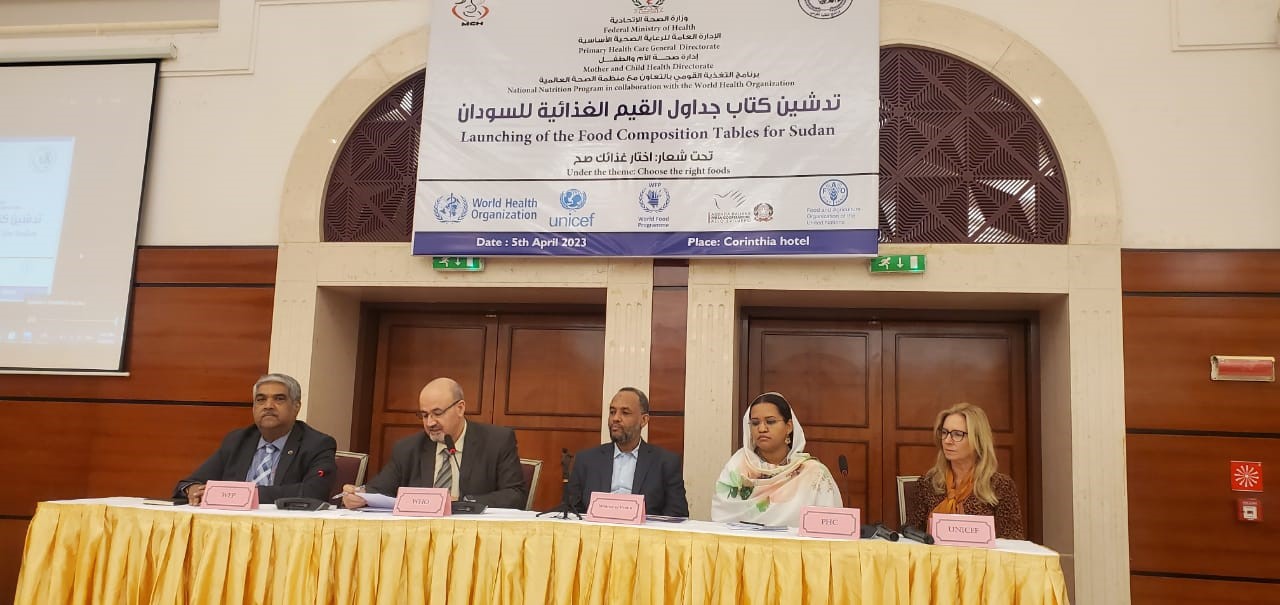
On 5 April 2023, the Ministry of Health of Sudan launched its first comprehensive food composition tables, with technical support from the World Health Organization, to provide data on the inherent nutritional quantity and quality of foods consumed in Sudan.
Sudan, like other developing countries in Sub-Sahara Africa, is faced with the challenges of under- and over-nutrition problems, such as protein energy malnutrition and micronutrient deficiencies, with women and children are often being the most vulnerable. Malnutrition is associated with poor physical and mental development in children and reduced work performance in adults.
Nutritionists, dieticians and other groups expressed the need for the development of a comprehensive reference giving the composition of Sudanese foods to help formulate and describe solutions based on the nutritional quality of conventional Sudanese foods and bridge the main dietary gaps.
The food composition tables were developed through an extensive process by a group of scientists from various academic and research institutions, who came together under the umbrella of the Federal Ministry of Health to compile data on the composition of major, conventionally known, Sudanese raw, cooked, and semi-prepared commodities, as well as dishes, stews, and casseroles. The food composition tables provide data on 340 local food items and 24 traditional recipes, including 18 mixed ingredient recipes and six recipes for children (6–23 months).
The nutritional composition of foods provides information on values for energy, macronutrients (carbohydrates, fiber, lipids, protein etc.) and micronutrients (minerals and vitamins), which will be used for the prevention of malnutrition through identifying and promoting local nutritious foods. Also, nutrition data may be used by the public and private sector to establish food-based dietary guidelines for diversification, fortification and food labelling. The information provides evidence for the development of nutrition, health and agricultural strategic policies to facilitate interventions to provide adequate nutrients for the population through diet.
Dr Abid Ni’ma Saeed, WHO Representative in Sudan, joined Dr Haitham Mohammed Ibrahim Awad Allah, H.E. acting Federal Minster of Health Sudan, Dr Dalya Eltayeb, Primary Health Care Director-General of the Ministry of Health, Mr Peter Rodriguez Deputy Country Director of the World Food Programme, and Ms Mary Louise Deputy, UNICEF Representative in Sudan, in an event to launch the 2022 food composition tables. Dr Saeed acknowledged this milestone achievement for Sudan and urged all nutrition partners to support families and communities in choosing optimal healthy diets. He also acknowledged the financial support of Italian Cooperation in Sudan that has been instrumental in the successful completion of the work. He said that WHO would continue supporting prevention and treatment of malnutrition in Sudan through working closely with the federal and state ministries of health, other line ministries, donors, United Nations agencies, the private sector, civil society organizations, and nongovernmental organizations to contribute to the eradication of hunger and prevention of all forms of malnutrition.


